
Each year the seven departments of the UCLA Samueli School of Engineering, and the school as a whole, bestow honors on graduating students who have had distinguished accomplishments and made special contributions. Below are short Q&A’s with this year’s school-wide recipients.
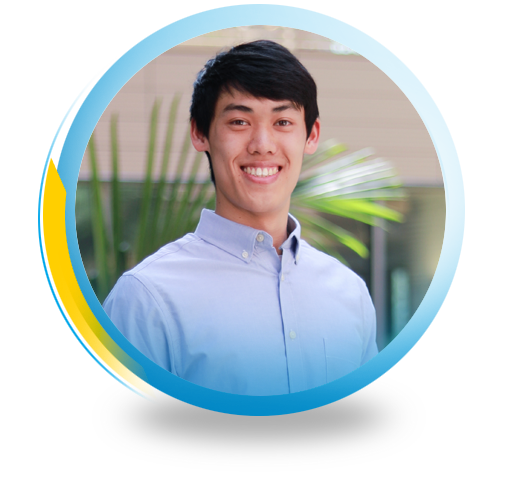
Jason Wong ’19
2019 Outstanding Bachelor of Science Award
Wong graduates with a bachelor’s degree in computer science. He had internships with Facebook, Uber, Symantec and Chronicle Security, Google X “moonshot” company. He will join Chronicle as a software engineer following graduation. Wong was also an active member of Upsilon Pi Epsilon, the computer science honor society.
Q&A
What was your favorite class that you took, and why?
Two classes stand out as my favorites.
The first one is CS32, Algorithms in C++, with Professor Carey Nachenberg.
I have really great memories from the lectures of this course. They were filled with hilarious stories, surprises, and games, all of which reminded me that I can have fun with my coding and learning. As an added bonus, Professor Nachenberg was super passionate about teaching, and the course content helped me build a strong fundamental skill set for my later work and projects.
The second is CS136, Computer Security, with Dr. Peter Reiher.
I had a lot of fun with the lab assignments in this course. In one lab, I was sniffing unprotected network traffic and remotely modifying the webpage displayed in a fake victim’s web browser. In another lab, I was cracking passwords on a filesystem with relaxed security measures. And in another, I was a computer forensic analyst investigating a machine to uncover a crime. It was fascinating to learn about the cybersecurity techniques that keep us safe.
You were part of Dr. David Shattuck’s group at the Brain Mapping Research Center for a few years. What did you work on?
My work was focused on writing software for brain MRI analysis. My main research project involved creating an automated quality control system for brain MRI processing. In simplest terms, the system would process many brain MRIs in parallel, aggregate and display intermediate stages of the MRI processing in an interactive web application, and use statistical analysis to automatically flag intermediary MRIs that were misprocessed or anomalous. I received great mentorship and guidance from Dr. Shattuck and everyone in his research group, and my time there certainly helped me grow as a researcher and software engineer.
3. Were you always thinking of working right after graduation? And what will you be doing at Chronicle Security?
I wasn’t always set on working right after finishing my undergraduate studies. Going to graduate school to pursue research was in the back of my mind, but after completing a few software internships, I became passionate about working in the software industry. I’ll soon be headed to Chronicle Security in Palo Alto, California, where I’ll be working on the backend system for a cybersecurity product that helps identify security threats within a company’s network.
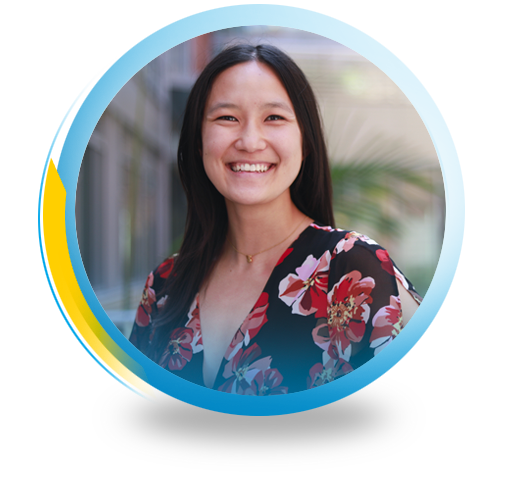
Allison Doami ’19
Russell R. O’Neill Distinguished Service Award
Doami graduates with a bachelor’s degree in electrical engineering. She co-founded the student organization Women Advancing Tech through Teamwork (WATT) and she’s been part of the Idea Hacks hackathon in 2017 and 2018. Following graduation, Doami joins the Chan Zuckerberg Initiative as a software engineer.
Q&A
What was your favorite class and why?
My favorite class was ECE115A which is Analog Circuits. I took the class with a bunch of my friends when Shervin Moloudi, one of my all-time favorite professors, taught. I felt as though this class was a rite of passage to becoming a true electrical engineer and I learned so much in just 10 weeks. Even though it was a tough class, Professor Moloudi made it easier by making analogies when explaining concepts about circuits.
What was the motivation for co-founding WATT (Women Advancing Tech through Teamwork)
When I was in high school, I started a club called GALS, which stood for Girls Advancing Leadership in STEM. The mission of the organization was to inspire younger girls to pursue a career in STEM. When I got to UCLA, I noticed how few women in electrical engineering there were, and set out to create an organization that would foster a more inclusive environment for women and minorities in EE. WATT has been such a defining factor in my college career, and I am so grateful that I was able to work with so many talented young women to make positive changes to UCLA’s engineering community.
How did the opportunity to work at the Chan Zuckerberg Initiative (CZI) come about?
I had the privilege to attend the Grace Hopper Celebration in 2018, where I learned about CZI, and got to meet their engineers and learn more about the company and their mission. After interning for three big companies, I knew I wanted to work for a smaller company that made a positive impact on the world, and found CZI a perfect fit for me. I am passionate about all of their initiatives, but especially supplying the tools to make every student succeed, regardless of where they live, or what their socioeconomic status is. As an incoming infrastructure software engineer, I’ll be supporting the tools that help students unlock opportunities that might’ve been unobtainable before.
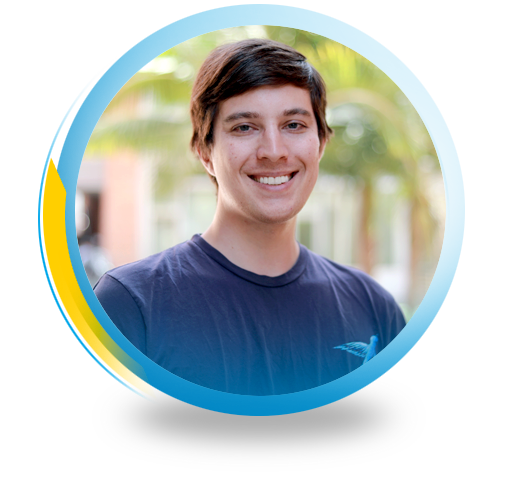
Tandré J. Oey ’14, MS ’15, PhD ’19
Harry M. Showman Prize (graduate student)
Oey is the graduate winner of the Showman Prize, which honors students for communicating research. Oey receives his Ph.D. in civil and environmental engineering. Following graduation, he joins VTT Technical Research Centre of Finland, where he will continue to study cement and concrete with its building materials group.
Q&A
Can you explain your doctoral research in general terms? And how could this be applied?
My Ph.D. research has focused on the reactivity of silicate and aluminosilicate materials. Better understanding of this reactivity is key to enhancing material durability and sustainability in many contexts, with concrete infrastructure applications being among the most pressing, as concrete production accounts for nearly 10% of global carbon emissions.
One aspect of the research has led to an improved ability to replace carbon-intensive components of concrete by maximizing the reactivity of alternative aluminosilicate binding agents. Another aspect has led to new means of improving concrete’s service life by minimizing the reactivity of poor-quality silicate starting materials, which would normally cause cracking over time. Initial steps have also been taken to test the feasibility of machine learning algorithms for predicting concrete’s mechanical properties on the basis of material reactivity.
What appealed to you about pursuing a doctorate at UCLA? How did you get interested in your field?
The story of how I ended up pursuing a doctorate at UCLA is the same as that of how I got interested in my field: I stumbled into research in the field by pure chance, and ended up loving it. Starting at UCLA as an undergraduate, I began research on cement and concrete during my sophomore year after taking a class from my current advisor, Professor Gaurav Sant. Suffice it to say, he was the best advisor I could have possibly hoped for, and that is in large part why I have continued on at UCLA for my doctorate in this field.
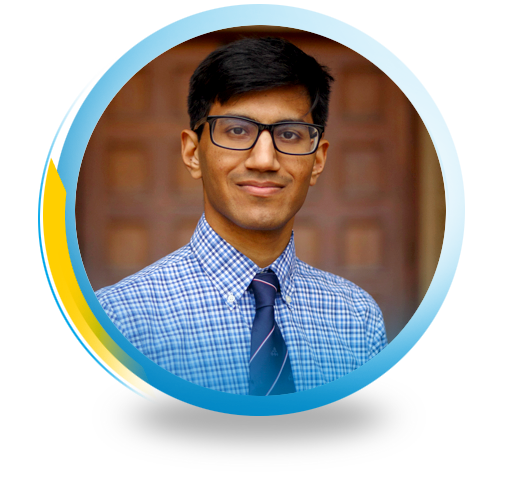
Zubin Mishra ’19
Harry M. Showman Prize (undergraduate student)
Mishra graduates with a bachelor’s degree chemical engineering, and a minor in bioinformatics. He was a member of two research labs – Professor Dante Simonetti’s group, and the Doheny Vision Research Center. In the fall, he starts a master’s degree program in bioinformatics at Georgetown University and he plans to apply to medical school after.
Q&A
What was your favorite class at UCLA and why?
My favorite class at UCLA would have to be Chemical Engineering 104D – Molecular Biotechnology Laboratory: From Gene to Product. It felt like the true culmination of my chemical engineering education in the biomolecular concentration. I have always enjoyed lab classes, and 104D’s relevant and interesting course material puts it at the top of my list. Professor Tang and the TAs, Byron and Sunny, also gave the class a relaxed atmosphere and made it an entertaining and enjoyable experience.
Can you explain the research you worked on, in general terms?
I have worked in two labs, as part of Simonetti Research Group and as part of the Doheny Vision Research Center.
In the Simonetti Research Group, I produced metal oxide nanofibers via electrospinning for the purpose of carbon of capture. This research has obvious environmental applications in reducing carbon emissions, but it also has industrial applications, such as increasing hydrogen yield in steam methane reforming.
At the Doheny Vision Research Center, I work on applying probability maps from deep learning neural networks to the layer segmentation of retinal images. The manual grading of retinal images is a time-consuming and arduous process, and this research seeks to allow for the quick and accurate diagnosis of retinal diseases.
How did you get interested in research in the first place?
It is hard to pinpoint how I first got interested in research. I participated in the Science Fair during grade school. I also participated in Science Olympiad and in FIRST Robotics. In all of these early experiences, I was challenged to come up with ways to test and implement new ideas. They all helped to develop my love for experimentation and experimental design. I sought out proper research lab experience once I came to UCLA to continue pursuing these interests and only fell more in love with them.
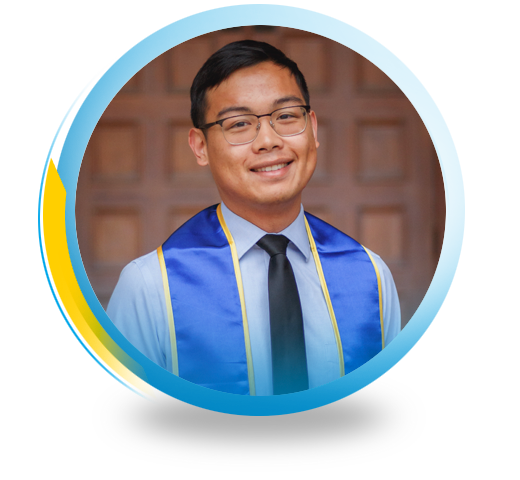
Joshua Abraham ’19
Student Speaker
Abraham graduates with a bachelor’s degree in chemical engineering. He was president of the Renewable Energy Association, and an officer in the American Institute of Chemical Engineers. He was also a University of California Leadership Excellence through Advanced Degrees scholar. In the fall, Abraham starts graduate study at the University of Wisconsin-Madison.
Q&A
What was your favorite class and why?
It is hard to pick only one! I enjoyed learning from classes inside and outside of my major, but one class that comes to mind is Chemical Engineering 104D. As the senior lab class for the biomolecular track of the major, the material was most relevant to my future graduate studies, introducing me to techniques I did not learn from my undergraduate research and helping me practice scientific communication. Beyond the material, I had a wonderful time with my tight-knit community and was inspired by the fantastic instructors.
What message do you want to impart to your fellow graduates?
There are so many things to say and so many people to thank during commencement season, so I was challenged to think about what mattered most to my peers and me. For many, graduation comes with mixed feelings of accomplishment and fear of the future. I wrote my speech to remind the graduates of their achievements and want them to feel confident that their perseverance will guide them to success wherever they go. I hope that my speech will encourage my peers to reflect on the deeply personal experience of commencement and am humbled to help conclude a chapter in our lives.
* You’re going to the University of Wisconsin, Madison for graduate study, what are your eventual goals?
I have known for a long time that I love teaching, and my experiences at UCLA as a learning assistant for organic chemistry and a mentor in student organizations have only solidified that passion. Through my Ph.D. studies, I hope to continue teaching while deepening my research contributions in sustainable biosynthesis. Eventually, I would like to pursue a faculty position at a university to both teach and perform research. I also look forward to building resources for educational equity through service in organizations and committees as a future science professional. It feels like such a long journey to that point, but I am confident that, just like my time at UCLA, it will fly by in a blink of an eye!
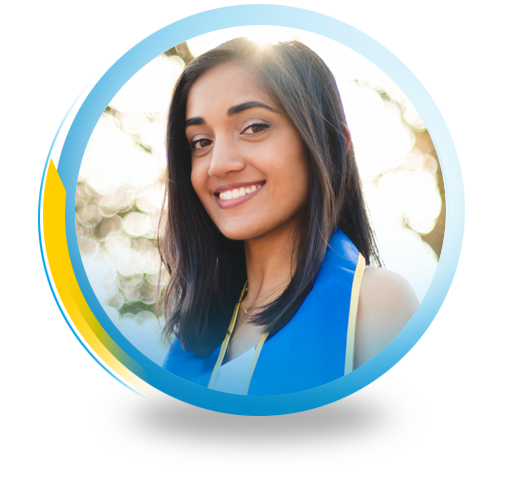
Uma Lakshminarayan ’19
National Anthem Singer
Lakshminarayan graduates with a bachelor’s degree in computer science. At UCLA she was part of two musical groups. She was also an active member of the Association for Computing Machinery–Women (ACM-W). Following graduation, Lakshminarayan will join LinkedIn in the Bay Area as a software engineer.
Q&A
What was your favorite class at UCLA, and why?
My favorite class at UCLA was Music and the Refugee Crisis. It was an Ethnomusicology class taught by Alyssa Mathias, a graduate student doing related research. We learned about how music can help refugees cope with being displaced and help them retain their culture. We also learned how music can fuel different ideologies and spark civil unrest that leads to these crises. Our instructor also showed us games and videos in which we experienced the hardships of being displaced through a refugee’s perspective. This class was very eye-opening and made me more empathetic towards past and current refugee crises.
How did you become interested in singing?
I owe my interest in singing to my mom. She taught me nursery rhymes and religious songs when I was a toddler, and I have been singing ever since. I learned a type of Indian classical music, called Carnatic music, growing up, and I also participated in choir in middle school and high school.
You’ve been part of two musical groups since at UCLA. Can you tell a little about them?
Joining Naya Zamaana, the South Asian a Capella team at UCLA, was a great opportunity to continue my interests in both Indian and Western music. Together, my team and I have competed across the country and even worked on an album that will be released later this year! I eventually became the choreography director for the team, and it has been a challenging, but rewarding experience to come up with movements that fit the music. My friend Sanjana started the band Offbeat when she wrote a song that needed more instruments and voices to bring it to life. We competed in Spring Sing this year, which pushed me to understand how different musical elements can interact together to convey the feeling of the song. I’ve met some of my best friends through these experiences, and I’m so thankful for all of the time we’ve spent together and the life-long memories we’ve made.
